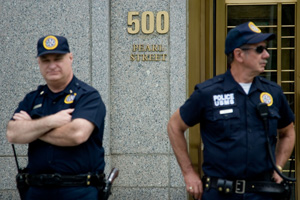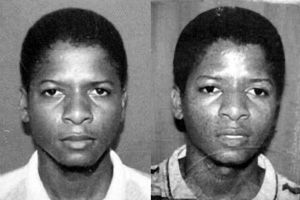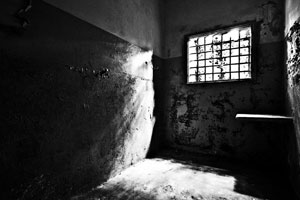Read Karen Greenberg’s previous coverage of the Ghailani trial here.
The courtroom for the Gitmo trial gets emptier each day, as the press turns its attention to other matters in New York’s Southern District Courthouse. Today’s distraction was the long-awaited terrorism conviction of four men in what’s known as the Bronx synagogue case. But away from the bustle of cameramen and reporters outside the courthouse, the jury and judge in the case of Ahmed Khalfan Ghailani are focused entirely on his alleged involvement in the 1998 bombings in east Africa. And for good reason, because as today’s session made clear, there are challenges of a subtle nature in this Gitmo case that are likely to haunt it to the end.
On the surface, the day’s proceedings took the jury one level deeper into the story of Ghailani’s alleged role in the Tanzania embassy attack. Having called survivors and eyewitnesses as well as FBI forensic experts, the prosecution presented three Tanzanians who testified to unwittingly providing help—batteries, some welding, storage—to Ghailani as he allegedly modified a white Nissan truck to be a car bomb.
Illustrating the fragility of the testimony in the case, defense attorney Peter Quijano tried repeatedly to get a consistent answer from a witness, Salum Issa Mohammed, about the location of rooms where Ghailani and an associate lived. Mohammed contradicted documents and even his own testimony. “I don’t remember,” he claimed again and again, in answer to seemingly simple questions such as how many bedrooms there were in Ghailani’s alleged residence, which he said he had visited often. Finally, Mohammed found a way to explain his muddy responses: “It’s been 12 years!” he pointed out to the persistent defense attorney. “I don’t remember.”
But there was another, less obvious factor underlying Mohammed’s testimony—the factor of fear. Quijano suggested that Mohammed was fingering Ghailani because he feared he’d be arrested—his boss had already been taken to jail in the wake of the bombing. “Were you scared?” Quijano asked, and Mohammed answered without hesitation, “Yes.”
Judge Lewis Kaplan, who so far in this case has seemed the most adept at coaxing a revealing narrative out of witnesses, once again extracted a telling detail. “Did any FBI agents speak to you in Swahili?” Judge Kaplan asked. “No,” said Mohammed, “only translators, and police officers from Tanzania.” Was Mohammed right to be worried about the Tanzanian authorities? He wouldn’t be the first. In his opinion upholding the suppression of the witness Hussein Abebe (see earlier posts), Judge Kaplan noted that Tanzanian police had warned him, ahead of his own interrogations, “to tell what he knew so that he could go home, in itself an implicit threat…[Abebe] was aware also that the TNP sometimes had been known to detain people without their families knowing where they had been taken and to ‘come and grab you and take you by force.'”
The distance between Dar es Salaam and New York City seems vaster each day—and that, ultimately, might be just what the defense wants the jury to take away.
Research for this report was contributed by CLS Researchers Samantha Schott ad Christine Yurechko.











